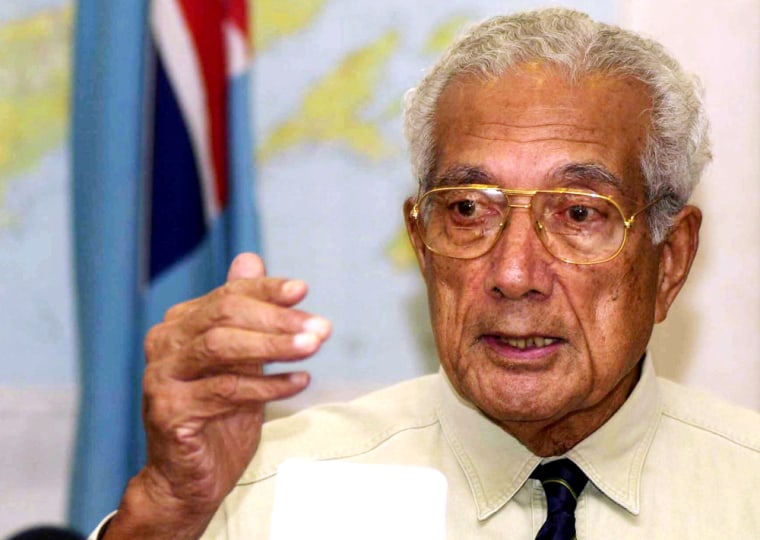Ratu Sir Kamisese Mara, Fiji’s first prime minister and a dominant statesman in Pacific Island regional affairs for nearly 30 years, has died, New Zealand media reported Monday. He was 83.
Mara died late Sunday in a hospital in the Fijian capital, Suva, from complications of a stroke he had in 2001, New Zealand’s Radio National reported.
Fijian authorities did not immediately confirm the report. The government was expected to make an announcement later Monday after informing tribal chiefs.
Mara was the last survivor of a group of powerful, mostly hereditary Pacific Island chiefs who led their countries to independence from British, Australian, New Zealand and U.S. colonial rule from the mid 1960s.
Bickering tribes
Mara was the paramount chief of the Lau Islands of eastern Fiji. He was revered for holding together bickering tribes as he welded Fiji into a stable, multiracial nation after 96 years of colonial British rule. Fiji gained independence in 1970.
Through the ’70s and ’80s, the United States, Australia and New Zealand regarded Mara as key to keeping the South Pacific free of communist influences.
The United States persuaded him to ban Soviet vessels from Fiji’s ports during a period when Moscow was trying to establish a presence in the region.
Mara also was for many years a major figure in trade and aid negotiations between the European Union and more than 70 Africa, Caribbean and Pacific countries.
Visitors to his homes were often startled to see Mara — an international statesman who preached democracy and equality — become angered if visitors did not approach him on their knees as tribal custom called for.
Fiji, which kept Britain’s Queen Elizabeth II as its monarch after independence, became a republic after a 1987 coup that toppled its first government. Mara, who with his son was linked to the coup, became Fiji’s president seven years later.
Retired during hostage crisis
His retired over a May 2000 incident in which an armed gang stormed Parliament and held the prime minsiter and Cabinet hostage for 56 days. One hostage was Tourism Minister Adi Koila Mara Latikau, one of Mara’s three daughters, whom Mara said the gang threatened to kill if he called out the army.
Seen as a hurdle in resolving the hostage crisis, Mara was asked to retire as the army declared martial law. Embittered by what he felt was national rejection, Mara retreated from public life to his home islands of Lau.
Mara is survived by his wife, Ro Lala Mara, a paramount chief who outranked Mara in the Fijian aristocratic hierarchy, three daughters and two sons. A third son was killed in a road accident. Funeral arrangements were not immediately announced.
